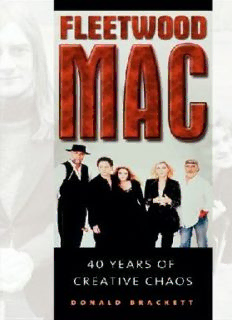
Fleetwood Mac: 40 years of creative chaos PDF
Preview Fleetwood Mac: 40 years of creative chaos
Fleetwood Mac 40 Years of Creative Chaos Donald Brackett LibraryofCongressCataloging-in-PublicationData Brackett,Donald,1951– FleetwoodMac:40yearsofcreativechaos/DonaldBrackett. p.cm. Includesbibliographicalreferencesandindex. ISBN-13:978–0–275–99338-2(alk.paper) ISBN-10:0–275–99338–8(alk.paper) 1. FleetwoodMac(Musicalgroup) 2. Rockmusicians—Biography. I.Title. ML421.F57B73 2007 782.42166092’2—dc22 2007020592 BritishLibraryCataloguinginPublicationDataisavailable. Copyright©2007byDonaldBrackett. Allrightsreserved.Noportionofthisbookmaybe reproduced,byanyprocessortechnique,withoutthe expresswrittenconsentofthepublisher. LibraryofCongressCatalogCardNumber:2007020592 ISBN-10:0–275–99338–8 ISBN-13:978–0–275–99338–2 Firstpublishedin2007 PraegerPublishers,88PostRoadWest,Westport,CT06881 AnimprintofGreenwoodPublishingGroup,Inc. www.praeger.com PrintedintheUnitedStatesofAmerica Thepaperusedinthisbookcomplieswiththe PermanentPaperStandardissuedbytheNational InformationStandardsOrganization(Z39.48-1984). 10987654321 Inmemoryofmyfather,andinappreciationofmymother,forletting mebe... Thisbookisdedicatedtomywonderfulpartner MimiGellman,whoknowsallthereasonswhy... TomyoldfriendsGerryWatsonandPeterMoss,whomayormaynot. TomyfellowwriterKevinCourrier,whosharesthestruggle. AndtoBobWelch,masterofthespookytransition. Contents Introduction:Pluggingin ix Chapter1.BritishBluesinthe1960s:TheMusicalRootsof 1 FleetwoodMac Chapter2.TheOriginalPeterGreen’sFleetwoodMac 21 Chapter3.TheGoingofGreen:MadnessandManalishi 47 Chapter4.Rebirth:TheComingofChristinePerfectandBobWelch 69 Chapter5.Reincarnation:TheComingofBuckinghamandNicks 95 Chapter6.TheRumoursAreTrue:ArrivaloftheBlockbuster 117 Chapter7.Tusk:BuckinghamTakesCommand 135 Chapter8.ThenPlayOn,Again:TheLastTwenty-SevenYears 153 Conclusion:Unplugged—SayYouMightasWell 171 Notes 175 Index 183 A photo essay follows page 94. Introduction: Plugging in ‘‘IfMusicbetheFoodofLove,playon...’’ —Shakespeare How do you celebrate the 40th anniversary of a perfect marriage made in hell?Perhapsbycountingyourluckystars—orevenbetter,maybebycount- ingyourmoney. Imaginetwooldgeezers.Nothingcancomebetweenthem.Youcansee them,MickFleetwoodandJohnMcVie,bothbaldwithsnowywhitepatri- archalbeards,sittingonthemassiveterracesoftheircountryestates,where they often visit each other for high tea and ponder how it is they are still togetherafteralltheseyears.Oneoftheoldladsmayturntotheotherand quoteJohnLennon,inbetweensipsofEarlGrey:‘‘Lifeiswhathappensto youwhileyou’rebusymakingotherplans.’’‘‘Indeeditis,mate.’’ Fleetwoodturns60thisyear,andMcVieisalreadyacrusty62.Bothare stillcrazyafteralltheseyearsandtears.Theyarebonafiderockroyalty,no matter what your musical taste. Back in 1992, when Mick was celebrating themere25thanniversaryofhislittleexperimentinmusicalmayhem,hepro- ducedalovelypictorialbookwithatextbyStephenDavis.Itopenswitha touchingandsurprisinglytenderobservationinhisdedicationofthebook tohismusicalpartner,McVie:‘‘ToJohn,fromthefirstuntilthis,thebrother Ineverhad,youhavebeentome.MyGod,Iswearwedeserveeachother.I loveyouverymuch,Mick’’ Not exactly the sentiment one might expect from a grizzled rock beast, and yet his tender side is there for all to see. That was 15 long years ago, andnowherewearecelebratingthe40thanniversaryoftheband’sfounding x Introduction inswingingEngland.Theyarestillatit,oratleaststilltalkingaboutbeing atit. Indeed,ifthelevelofmarketpenetrationisoneofthethingsthatdeter- minesalegend,thenFleetwoodMaccertainlyqualifies,eventhoughmany listenersand critics alikemaycastaspersionson their amazinggraspofthe goldrecordcontest.Commercialsuccessoftencreatesamusicalallergythat is undeserved, and in the case of Fleetwood Mac, their three successive careersqualifythemaslegendsofasort,eventhoughmostpeopletendto taketheirloftyBritishpeers,TheBeatles,farmoreseriously. Fewgroupshavemovedfromthestatusoflegendtomyth,andthenfrom mythtobrand,quiteasseamlesslyandmysteriouslyasthesemastersofboth disclosureandconcealment.Andyet,itgoeswithoutsayingthatMaclasteda fullfivetimesaslongastheirillustriousforbearersforsomesimplereasons: Lennon and McCartney began to manifest music as a kind of self- developmenttherapythroughthefleeingofalllimits,whileFleetwoodand McViealways sawmusic as a form of entertainmentcelebrating theaccep- tanceoflimits. For example, we can imagine the different message received by aliens if insteadofdiscoveringacopyofRevolverinourVoyagertimecapsuleashes, theydiscoveredRumours;oneshudders.LikeTheBeatles,theyexperienced therealityofJohnUpdike’sadmonitionthat‘‘Celebrityisamaskthateats intotheface.’’Buttheydidnotturnorrunawayfromit;instead,theychose towearthemaskproudly.Theyevenwentsofarastotitleoneoftheirlater efforts, Behind the Mask. While both groups did use their art as a ‘‘pain machine’’ for the healing, transformation,and transcendence of suffering, onlyFleetwoodMacmaintainedafirmgripontheirrootsintheblues(even when their blues was covered in the shiny varnish of their later-phase pop music).Moreimportantly,theyalsomaintainedtheirinseparablelinkascre- ativepartnersjoinedatthehip. Theirs is a truly unique and fruitful collaborativepartnership,despiteall the style shifts and personnel changes in their eponymous musical group. Thefollowingpagesservetoexplorethenatureoftheirhighlychargedcre- ativeconnection,whichpredateseventhebeginningoftheirownbandand thereforehastobereferredtoastheprehistoricperiodofFleetwoodMac. They are among the few rock dinosaurs who did not become extinct as a resultoftheperpetualclimatechangesinpopmusic,andtheysurvivedthe wayallevolutionarysurvivaloccurs:byadaptingtoreality. This long history of Fleetwood Mac’s chameleon-like adaptation, while stillholdingontotheirearlybluesrootsandmiddlepsychedelicphase,has often beenovershadowed bythe sheer scaleoftheirlater success.Butthat earlydynamicofcreativechaosmadethelatertriumphpossible.Thishistory clearlyindicates howthey cleverly shiftedgears fromblues to rock topop, andespeciallyhowtheysimplyturnedthosebluesintopurple,formsthecore ofthisbook.Theirstoryisawildride,andthoseofuswhoare‘‘ofanage’’ Introduction xi oftenfeelitwasourride,sincethisbandseemedtoechoandexpresssomany oftheissues,ideas,andevendisappointmentsofthepost-1960sera. Alongtheway,theridecontainssomeperhapssurprisingconnectionsthat mayhelpusunderstandhowFleetwoodMaceverexistedinthefirstplace,let alonehowtheymanagedtosubsistinthefaceofself-scrutiny,oneanother, andtherapidchangesofanentertainmentindustrythatseldomseesorprizes theirkindoflongevity.Therearealsoseveralinsightsthathelpexplainthe successoftheircreativechaos—mostimportantly,perhaps,theunusualcon- ceptputforwardbythepsychologistMihalyCsikszentmihalyi.Hisnotionof ‘‘flow,’’thepsychologyofoptimalexperience,clarifieshowthecreativestate required to make any art successfully, but especially music, requires an absorptioninthepresentmomentwhereallelsedisappears,asinglepointed formofconcentrationthatallowstheartisttoachievethework. Mostalarmingforsomeartistshowever,especiallythosecombativecrews suchasFleetwoodMac,istheironicfactthatincertainspecialcasesthatstate of ‘‘flow’’ is only possible while in the company of certain collaborators. Thesecollaborators,notsurprisingly,areseldomtheoneswereallygetalong with;quitethe opposite infact.imaginethecurse of being abletoachieve thatstate of ‘‘flow’’ outof which greatart or music originates,but only in thecompanyofsomeonewereallydonotlikeatall. What if your mortal enemy is your best friend, and the only one in the entire world who can make your magic possible? In the strange world of celebritycompanions,heldintheswayoftheforcesofcrowdsandpower,it happensmoreoftenthanyoumightthink.Recently,theNewYorkTimescul- ture critic Holland Cotter made a telling remark about our attempts to chronicle the past and fit it somehow neatly into our own present, not to mentionthefollyoftryingtoanticipatethefuturebaseduponit.Cottersug- gested that histories get lost, implying that that is just the way life is; and then, perhaps when the time is right, those same histories are found once again.Oursubplotherecouldthereforequiterightlybeentitled,‘‘Finding the Fleetwood Mac Muse.’’ That is precisely the purpose of this book: to reclaimsomeofFleetwoodMac’s‘‘losthistories’’andtietogetherthemean- deringthreadsthathavekeptthemonthepopmusicsceneforalmosthalfa century. Bygivingup,orsharing,creativecontrolwithChristineMcVieandlater, Stevie Nicks, the original core of the group, Mick Fleetwood and John McVie—ablastedbassistanddazeddrummer—wereabletoremainbehind the scenes and capitalize on the truly unique direction that this feminine dimensionopenedupforthem.Partofthatdistinctivequalityiswhatmade thisgroup’ssoundirreproducible:theyhaveachemistrythatcannotbecop- ied.Theirsoundcouldnotbeimitatedquiteaseasilyasthatofmanyoftheir equallyfamouspeers. To this we attribute their magnificently improbable balancing act, one poweredbyinternalconflictsandbizarrechemistry.Thisismorethanmerely
Description: